- Home
- Roald Dahl
Spotty Powder and other Splendiferous Secrets Page 2
Spotty Powder and other Splendiferous Secrets Read online
Page 2
Pour the fudge into the lined tin and leave to set. If necessary, smooth with a palette knife dipped into boiling water.
With shaped cutters, cut out the fudge and dip one side into the melted chocolate, or decorate with piped chocolate, creating different patterns.
Please ask a grown-up to help you when you are handling anything hot.
Come rain, shine, frost or snow, Roald Dahl could be found inside the shed at the end of his garden. This was where he wrote. And beside him there was a table where he kept his most favourite things. They’re all still there.
Here are some of the items on Roald Dahl’s table:
A ball made from silver chocolate wrappers.
A small model of a Hurricane fighter plane.
His hipbone.
A glass bottle filled with mauve-coloured bits of gristle taken from Roald Dahl’s spine during an operation.
A photo of his granddaughter Sophie.
A meteorite the size of a golf ball.
His father’s silver-and-tortoiseshell paper-knife.
A solar-powered musical box.
A carving of a green grasshopper.
A cone from a cedar tree.
‘I rather like the month of March … your heart is lifted by the signs of approaching spring all around you. Halfway through the month most of the hedges are covered with a pale powdering of green as the little leaf buds begin to burst, and the pussy willows are smothered in yellow pollen. Crocuses are flowering brilliantly and best of all, the nesting season is beginning to get seriously under way … I can see a pair of blackbirds building high up in the trunk of the big clipped yew tree … I watch a thrush carrying bits of dry grass up into the branches of the vine … I see a pair of blue tits popping in and out of a small hole in the wooden tool shed … I see a pair of robins making a mossy nest in the bank underneath the heather bed …
‘By the end of the month ladybirds are on the wing once again, and you will notice that nearly all of them are the two-spotted kind. Peacock butterflies and small tortoiseshells are emerging from their winter sleep, hunting for early flowers. Bumblebees and honeybees have also woken up and are in among the crocuses, looking for pollen.’
Roald Dahl and Quentin Blake make a perfect partnership of words and illustrations, but when Roald started writing, he had many different illustrators.
Quentin started working with him in 1976 (the first book he illustrated was The Enormous Crocodile, published in 1978) and from then on they worked together until Roald’s death. Quentin ended up illustrating all of Roald Dahl’s books, with the exception of The Minpins.
To begin with, Quentin was a bit nervous about working with such a very famous author, but by the time they collaborated on The BFG, they had become firm friends. Quentin never knew anything about a new story until the manuscript arrived. ‘You’ll have some fun with this,’ Roald would say – or, ‘You’ll have some trouble with this.’ Quentin would make lots of rough drawings to take along to Gipsy House, where he would show them to Roald and see what he thought. Roald Dahl liked his books to be packed with illustrations – Quentin ended up drawing twice as many pictures for The BFG as he had originally been asked for.
Quentin Blake was born on 16 December 1932. His first drawing was published when he was sixteen, and he has written and illustrated many of his own books, as well as Roald Dahl’s. Besides being an illustrator he taught for over twenty years at the Royal College of Art – he is a real professor!
‘It is Quent’s pictures rather than my own written descriptions that have brought to life such characters as the BFG, Miss Trunchbull, Mr Twit and The Grand High Witch. It is the faces and the bodies he draws that are remembered by children all over the world … When he and I work together on a new book and he has a pen in his hand, it is magical to watch the facility with which he can sketch out a character or a scene. “You mean more like this?” he will say, and the nib will fly over the paper at incredible speed, making thin lines in black ink, and in thirty seconds he has produced a new picture. “Perhaps,” I will say, “he should have a more threatening look about him.” Once again the pen flies over the paper and there before you is exactly what you are after. But this is not to say that I “help” him with many of the characters he draws for my books. Most of them he does entirely on his own and they are far better and funnier than anything I could think of.’
Roald Dahl kept two ideas books for about forty years. They were both old school exercise books, the first of which was sandy coloured, and the second red and very battered. He thought that good ideas were like dreams – soon forgotten – and made sure that he wrote them down straight away. He then ticked the really good ideas and crossed out the ones he had used. Some ideas were developed years and years after they were jotted down. Can you guess which books came from these ideas?
If Roald Dahl hadn’t been an author, he could have been a doctor, a boxer, a golfer, an inventor, a scientist, a botanist or a picture framer. He had a natural talent for all of these things. And he was interested in just about EVERYTHING. But here are a few of the things he was especially fascinated by:
Nineteenth- and twentieth-century paintings
Eighteenth-century English furniture
Gardening
Orchids
Music
Wine
Gambling
Good food
Chocolate
Roald Dahl once said, ‘If I were a headmaster I would get rid of the history teacher and get a chocolate teacher instead.’
‘Now at last we can say that spring has arrived, and with it come flocks of summer migrants, all those little birds that flew away to the warmer countries in the south when it began to get cold last October. Most of them go as far as North Africa and don’t ask me how they find their way there and back again because that is one of the great mysteries of the world. There are skylarks, greenfinches, goldfinches, whitethroats, willow-warblers, golden plovers, blackcaps, swallows, house-martins, chiffchaffs and many more besides, and soon after they arrive they pair up and start to build their nests.’
In 1929, when he was thirteen, Roald Dahl was sent to boarding school. You would expect him to get wonderful marks in English – but his school reports were not good!
EASTER TERM, aged 15. English Composition. ‘A persistent muddler. Vocabulary negligible, sentences malconstructed. He reminds me of a camel.’
SUMMER TERM, aged 16. English Composition. ‘This boy is an indolent and illiterate member of the class.’
There’s worse to come!
‘May is the month of the cuckoo … Everyone living in the countryside knows when the cuckoos start arriving because you cannot help hearing the loud, eerie, almost human call of the male bird. It quite literally says, “Cuck-koo, cuck-koo,” and the voice carries for miles … Unlike most other birds, cuckoos do not pair up and stay together, so there are no marriages or family life in cuckooland. No cuckoo has ever bothered to build its own nest or hatch or feed its young. The female (carrying her egg in her beak) searches the hedgerows until she finds the nest of another bird that already has eggs in it, and she slips her own egg in with the others and flies away and forgets all about it. ‘ … The mother hedge sparrow doesn’t seem to mind at all and proceeds to sit on the egg and incubate it together with her own. Little does she know what is going to happen when all the eggs hatch … the cuckoo chick grows three times as fast as the little sparrows. The overgrown baby cuckoo proceeds quite literally to push the baby hedge sparrows one by one out of the nest to die, and in the end all that is left is this grotesque, huge, fluffy cuckoo chick filling the entire nest. The hedge sparrow parents don’t seem to notice what has happened and they go on feeding this murderer until in the end it is big enough to hop out of the nest and fly away without so much as a thank you!’
Roald Dahl’s father died when Roald was only three so his mother brought up him and his sisters on her own.
Every Easter she rented a house in Tenby, Wales, and to
ok all the children there for a holiday.
The house, called The Cabin, was right next to the sea. When the tide was in, the waves broke right up against one wall of the house. Roald and his sisters used to collect winkles and eat them on slices of bread and butter.
‘June is the month of the foxglove, perhaps the most beautiful of all the wild flowers. The foxglove also gives us a drug called digitalis which is valuable to doctors in treating heart conditions. Barley is already standing tall in the fields. Don’t confuse it with the other two main cereals, wheat and oats. Barley has long itchy spikes covering the seeds, and if you pick one of these heads and slip it under the sleeve of your jacket or shirt with the long spikes pointing downwards, the head will actually climb all the way up to your shoulder as you walk along swinging your arm.
‘During this month the tadpoles in the ponds are beginning to sprout tiny arms and legs, and soon they will be turning into small frogs. Be nice to frogs, by the way. They are your friends in the garden. They eat the beastly slugs and never harm your flowers. There is so much beauty in the countryside in June. The lovely pink dog roses are in full bloom along the hedges and wild honeysuckle is plentiful.
‘I’m afraid that if you live in a town you don’t see any of these splendid sights …’
The following secret chapter was originally included in Charlie and the Chocolate Factory. But because there were too many naughty children in the earlier versions of the book, ‘Spotty Powder’ – and the revolting Miranda Mary Piker – had to be dropped.
Luckily, Roald Dahl kept it in a very safe place, so you could read it here …
‘This stuff,’ said Mr Wonka, ‘is going to cause chaos in schools all over the world when I get it in the shops.’
The room they now entered had rows and rows of pipes coming straight up out of the floor. The pipes were bent over at the top and they looked like large walking sticks. Out of every pipe there trickled a stream of white crystals. Hundreds of Oompa-Loompas were running to and fro, catching the crystals in little golden boxes and stacking the boxes against the walls.
‘Spotty Powder!’ exclaimed Mr Wonka, beaming at the company. ‘There it is!’ That’s it! Fantastic stuff!’
‘It looks like sugar,’ said Miranda Piker.
‘It’s meant to look like sugar,’ Mr Wonka said. ‘And it tastes like sugar. But it isn’t sugar. Oh, dear me, no.’
‘Then what is it?’ asked Miranda Piker, speaking rather rudely.
‘That door over there,’ said Mr Wonka, turning away from Miranda and pointing to a small red door at the far end of the room, ‘leads directly down to the machine that makes the powder. Twice a day, I go down there myself to feed it. But I’m the only one. Nobody ever comes with me.’
They all stared at the little door on which it said MOST SECRET – KEEP OUT.
The hum and throb of powerful machinery could be heard coming up from the depths below, and the floor itself was vibrating all the time. The children could feel it through the soles of their shoes.
Miranda Piker now pushed forward and stood in front of Mr Wonka. She was a nasty-looking girl with a smug face and a smirk on her mouth, and whenever she spoke it was always with a voice that seemed to be saying, ‘Everybody is a fool except me.’
‘OK,’ Miranda Piker said, smirking at Mr Wonka. ‘So what’s the big news? What’s this stuff meant to do when you eat it?’
‘Ah-ha,’ said Mr Wonka, his eyes sparkling with glee. ‘You’d never guess that, not in a million years. Now listen. All you have to do is sprinkle it over your cereal at breakfast-time, pretending it’s sugar.
Then you eat it. And then, exactly five seconds after that, you come out in bright red spots all over your face and neck.’
‘What sort of a silly ass wants spots on his face at breakfast-time?’ said Miranda Piker.
‘Let me finish,’ said Mr Wonka. ‘So then your mother looks at you across the table and says, “My poor child. You must have chickenpox. You can’t possibly go to school today.” So you stay at home. But by lunch-time, the spots have all disappeared.’
‘Terrific!’ shouted Charlie. ‘That’s just what I want for the day we have exams!’
‘That is the ideal time to use it,’ said Mr Wonka. ‘But you mustn’t do it too often or it’ll give the game away. Keep it for the really nasty days.’
‘Father!’ cried Miranda Piker. ‘Did you hear what this stuff does? It’s shocking! It mustn’t be allowed!’
Mr Piker, Miranda’s father, stepped forward and faced Mr Wonka. He had a smooth white face like a boiled onion.
‘Now see here, Wonka,’ he said. ‘I happen to be the headmaster of a large school, and I won’t allow you to sell this rubbish to the children! It’s … criminal! Why, you’ll ruin the school system of the entire country!’
‘I hope so,’ said Mr Wonka.
‘It’s got to be stopped!’ shouted Mr Piker, waving his cane.
‘Who’s going to stop it?’ asked Mr Wonka. ‘In my factory, I make things to please children. I don’t care about grown-ups.’
‘I am top of my form,’ Miranda Piker said, smirking at Mr Wonka. ‘And I’ve never missed a day’s school in my life.’
‘Then it’s time you did,’ Mr Wonka said.
‘How dare you!’ said Mr Piker.
‘All holidays and vacations should be stopped!’ cried Miranda. ‘Children are meant to work, not play.’
‘Quite right, my girl,’ cried Mr Piker, patting Miranda on the top of the head. ‘All work and no play has made you what you are today.’
‘Isn’t she wonderful?’ said Mrs Piker, beaming at her daughter.
‘Come on then, Father!’ cried Miranda. ‘Let’s go down into the cellar and smash the machine that makes this dreadful stuff!’
‘Forward!’ shouted Mr Piker, brandishing his cane and making a dash for the little red door on which it said MOST SECRET – KEEP OUT.
‘Stop!’ said Mr Wonka. ‘Don’t go in there! It’s terribly secret!’
‘Let’s see you stop us, you old goat!’ shouted Miranda.
‘We’ll smash it to smithereens!’ yelled Mr Piker. And a few seconds later the two of them had disappeared through the door.
There was a moment’s silence.
Then, far off in the distance, from somewhere deep underground, there came a fearful scream.
‘That’s my husband!’ cried Mrs Piker, going blue in the face.
There was another scream.
‘And that’s Miranda!’ yelled Mrs Piker, beginning to hop around in circles. ‘What’s happening to them? What have you got down there, you dreadful beast?’
‘Oh nothing much,’ Mr Wonka answered. ‘Just a lot of cogs and wheels and chains and things like that, all going round and round and round.’
‘You villain!’ she screamed. ‘I know your tricks! You’re grinding them into powder! In two minutes my darling Miranda will come pouring out of one of those dreadful pipes, and so will my husband!’
‘Of course,’ said Mr Wonka. ‘That’s part of the recipe.’
‘It’s what!’
‘We’ve got to use one or two schoolmasters occasionally or it wouldn’t work.’
‘Did you hear him?’ shrieked Mrs Piker, turning to the others. ‘He admits it! He’s nothing but a cold-blooded murderer!’
Mr Wonka smiled and patted Mrs Piker gently on the arm.
‘Dear lady,’ he said, ‘I was only joking.’
‘Then why did they scream?’ snapped Mrs Piker. ‘I distinctly heard them scream!’
‘Those weren’t screams,’ Mr Wonka said. ‘They were laughs.’
‘My husband never laughs,’ said Mrs Piker.
Mr Wonka flicked his fingers, and up came an Oompa-Loompa.
‘Kindly escort Mrs Piker to the boiler room,’ Mr Wonka said. ‘Don’t fret, dear lady,’ he went on, shaking Mrs Piker warmly by the hand. ‘They’ll all come out in the wash. There’s nothing to worry about. Off you go. Thank you for coming!
Farewell! Goodbye! A pleasure to meet you!’
‘Listen, Charlie!’ said Grandpa Joe. ‘The Oompa-Loompas are starting to sing again!’
‘Oh, Miranda Mary Piker!’ sang the five Oompa-Loompas, dancing about and laughing and beating madly on their tiny drums.
‘Oh, Miranda Mary Piker,
How could anybody like her,
Such a priggish and revolting little kid.
So we said, “Why don’t we fix her
In the Spotty-Powder mixer
Then we’re bound to like her better than we did.”
Soon this child who is so vicious
Will have gotten quite delicious,
And her classmates will have surely understood
That instead of saying, “Miranda!
Oh, the beast! We cannot stand her!”
They’ll be saying, “Oh, how useful
And how good!” ’
‘Sunday afternoons were the only times we had free throughout the school week, and most boys went for long walks in the countryside. But I took no long Sunday afternoon walks during my last term. My walks took me only as far as the garage in Wilmington where my lovely motorbike was hidden. There I would put on my disguise – my waders and helmet and goggles and wind jacket – and go sailing in a state of absolute bliss through the highways and byways of Derbyshire. But the greatest thrill of all was to ride at least once every Sunday afternoon slap through the middle of Repton village, sailing past the pompous prefects and the masters in their gowns and mortarboards. … Don’t forget that those were the days when schools like mine were merciless places where serious misdemeanours were punished by savage beatings that drew blood from your backside. I am quite sure that if I had ever been caught, that same headmaster would have thrashed me within an inch of my life and would probably have expelled me into the bargain. That is what made it so exciting. I never told anyone, not even my best friend, where I went on my Sunday walks. I had learnt from a tender age that there are no secrets unless you keep them to yourself and this was the greatest secret I had ever had to keep in my life so far.’

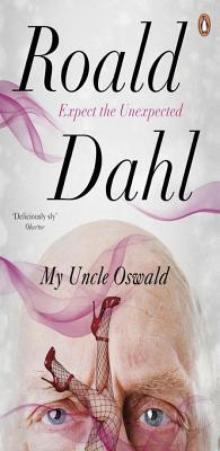 My Uncle Oswald
My Uncle Oswald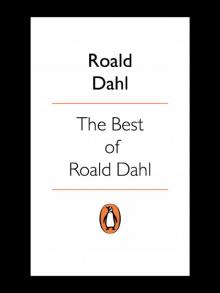 The Best of Roald Dahl
The Best of Roald Dahl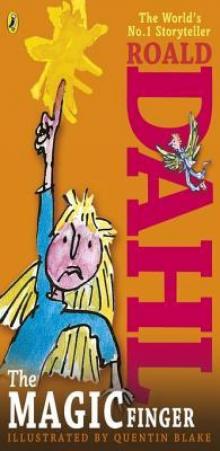 The Magic Finger
The Magic Finger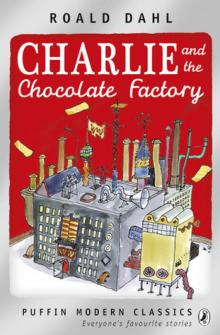 Charlie and the Chocolate Factory
Charlie and the Chocolate Factory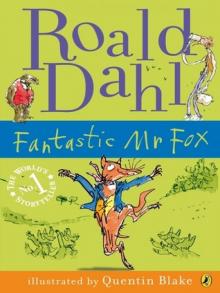 Fantastic Mr Fox
Fantastic Mr Fox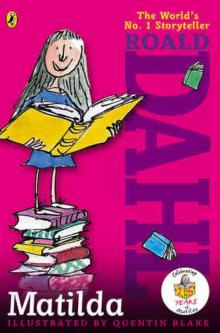 Matilda
Matilda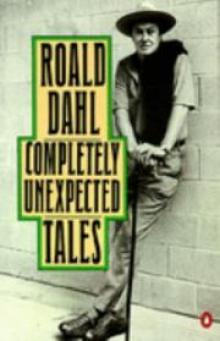 Completely Unexpected Tales: Tales of the Unexpected. More Tales of the Unexpected
Completely Unexpected Tales: Tales of the Unexpected. More Tales of the Unexpected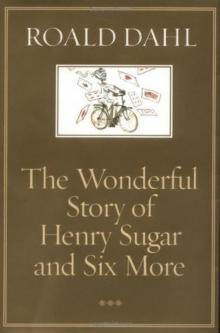 The Wonderful Story of Henry Sugar and Six More
The Wonderful Story of Henry Sugar and Six More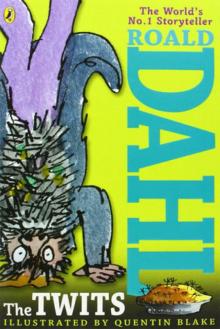 The Twits
The Twits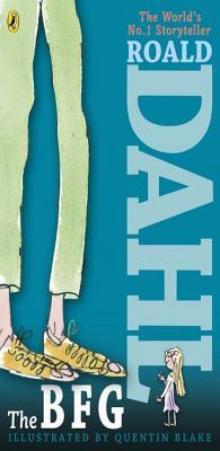 The BFG
The BFG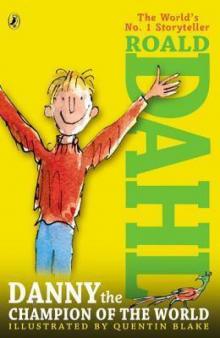 Danny the Champion of the World
Danny the Champion of the World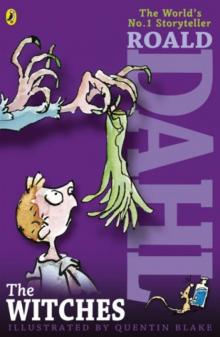 The Witches
The Witches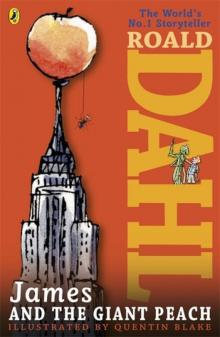 James and the Giant Peach
James and the Giant Peach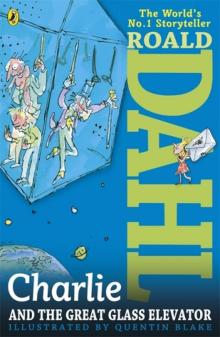 Charlie and the Great Glass Elevator
Charlie and the Great Glass Elevator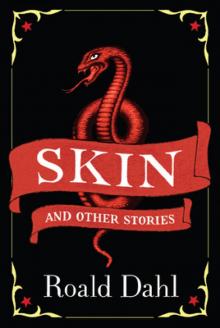 Skin and Other Stories
Skin and Other Stories Kiss Kiss
Kiss Kiss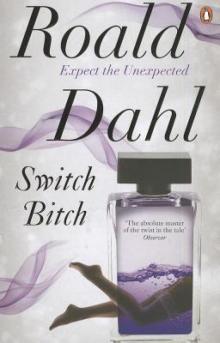 Switch Bitch
Switch Bitch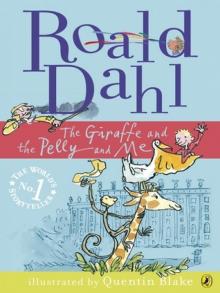 The Giraffe and the Pelly and Me
The Giraffe and the Pelly and Me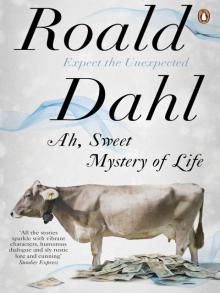 Ah, Sweet Mystery of Life
Ah, Sweet Mystery of Life Fear
Fear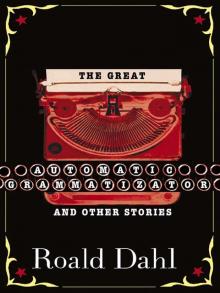 The Great Automatic Grammatizator and Other Stories
The Great Automatic Grammatizator and Other Stories Someone Like You
Someone Like You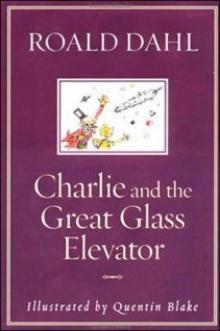 Charlie and the Great Glass Elevator c-2
Charlie and the Great Glass Elevator c-2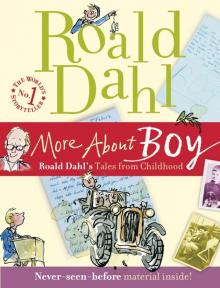 More About Boy
More About Boy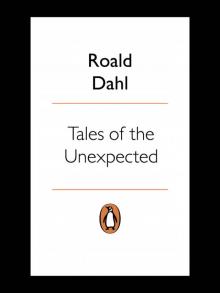 Tales of the Unexpected
Tales of the Unexpected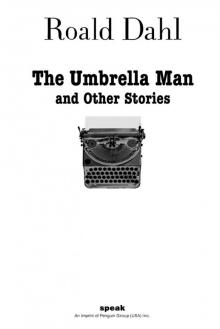 The Umbrella Man and Other Stories
The Umbrella Man and Other Stories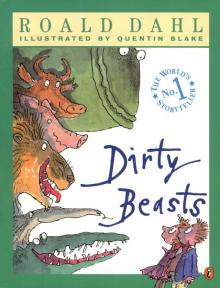 Dirty Beasts
Dirty Beasts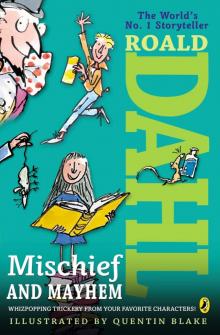 Roald Dahl's Mischief and Mayhem
Roald Dahl's Mischief and Mayhem The Collected Short Stories of Roald Dahl, Volume 1
The Collected Short Stories of Roald Dahl, Volume 1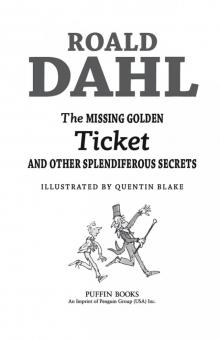 The Missing Golden Ticket and Other Splendiferous Secrets
The Missing Golden Ticket and Other Splendiferous Secrets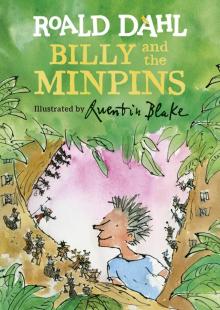 Billy and the Minpins
Billy and the Minpins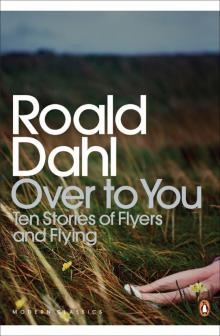 Over to You
Over to You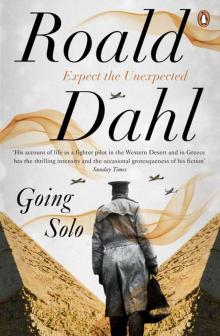 Going Solo
Going Solo Deception
Deception War
War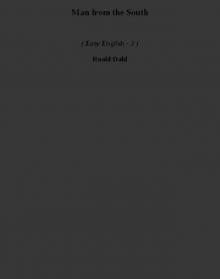 Man from the South ee-3
Man from the South ee-3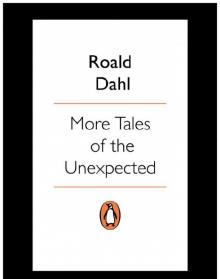 More Tales of the Unexpected
More Tales of the Unexpected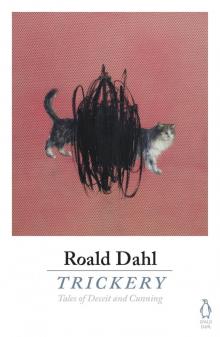 Trickery
Trickery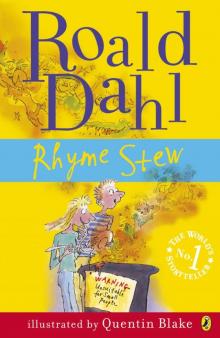 Rhyme Stew
Rhyme Stew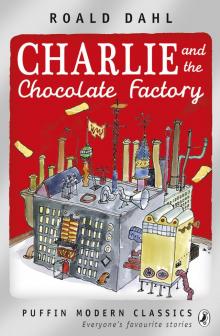 Charlie and the Chocolate Factory (Puffin Modern Classics relaunch)
Charlie and the Chocolate Factory (Puffin Modern Classics relaunch)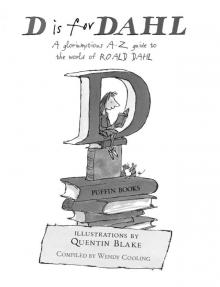 D is for Dahl
D is for Dahl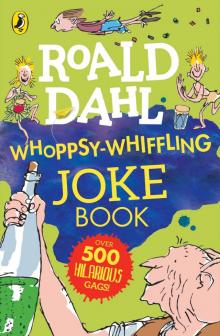 Roald Dahl Whoppsy-Whiffling Joke Book
Roald Dahl Whoppsy-Whiffling Joke Book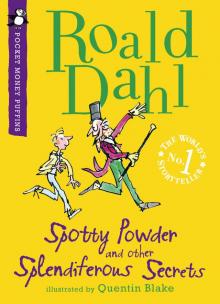 Spotty Powder and other Splendiferous Secrets
Spotty Powder and other Splendiferous Secrets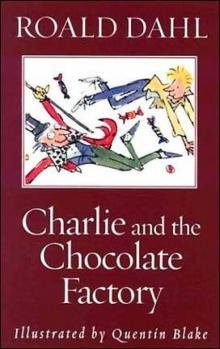 Charlie and the Chocolate Factory c-1
Charlie and the Chocolate Factory c-1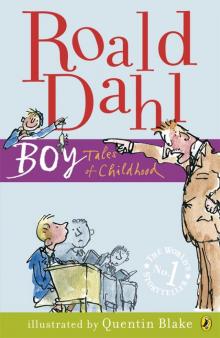 Boy
Boy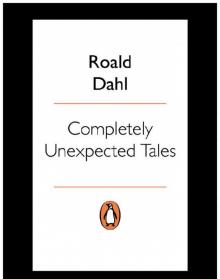 Completely Unexpected Tales
Completely Unexpected Tales Madness
Madness Innocence
Innocence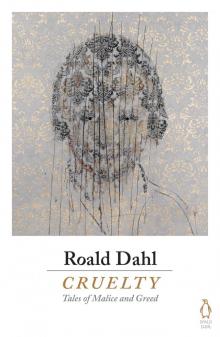 Cruelty
Cruelty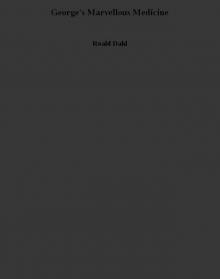 George's Marvellous Medicine
George's Marvellous Medicine